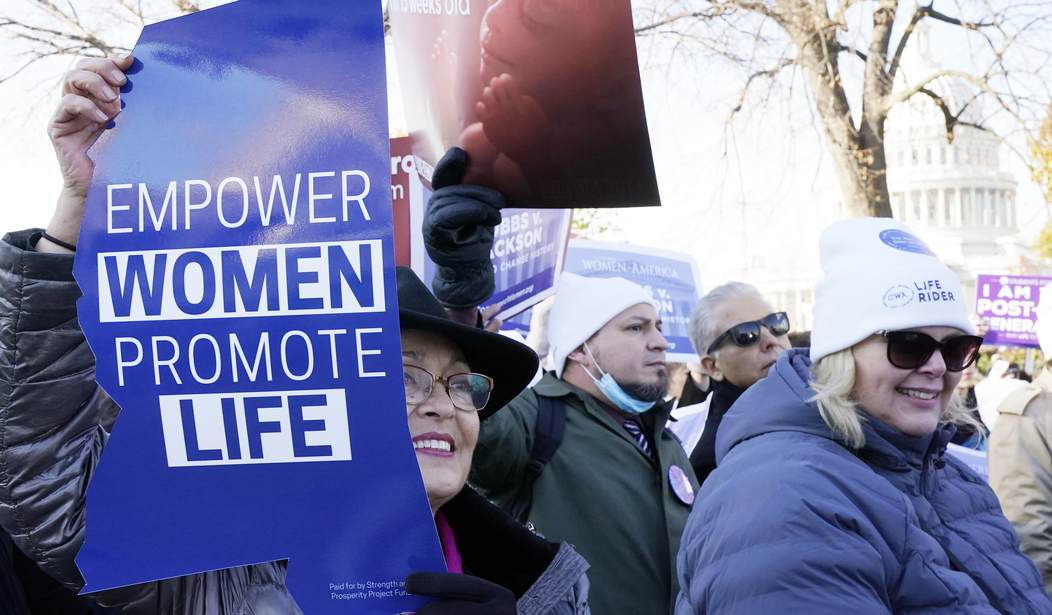A born-and-bred Northeasterner, I have been petrified that abortion would indeed prove to be the hill we conservatives die on. I've spent my entire life steeped in "abortion is just common sense" culture, and I confess that heartbeat laws triggered by the Dobbs decision seem to me to be too absolutist, too fast; they are too much to ask our current libertine society to spin on a dime and accept, let alone approve of.
"The 800-pound gorilla in the room is the political reality that abortion is unsettled on the national level, and that is costing us elections," I wrote last August. "Abortion aborted our long-promised red wave in 2022. Last night, it crushed Ohio conservatives’ attempt to shore up the state constitution against a new right to abortion — which will now likely be voted into existence in November." It was, on Nov. 7. Also on Election Day 2023, Democrats won control of the Virginia House of Delegates while holding onto their Senate majority. The victories capped off an election cycle throughout which Democrats had flogged abortion "rights" as their signal issue.
"For the foreseeable future," I predicted in August, "America is too packed with weaponized spinsters, bitter crones, and their neutered allies for the issue not to cause considerable headaches for the Right." Ohio and Virginia only served to cement my despair.
But then something wild happened in Louisiana on Saturday: Republicans swept all three statewide runoff elections, securing the offices of attorney general, secretary of state, and treasurer (Liz Murrill, Nancy Landry, and John Fleming, respectively). What's more, they each won two-thirds of the votes — a resounding victory.
The Republican sweep follows on the heels of last month's surprise Republican win of the Louisiana governor's office. "Democrats have been blindsided by a stunning Republican victory in a race for chief executive," I reported at the time. "Louisiana’s 'jungle primary' for the governor’s seat wrapped up on Saturday, and the state’s attorney general, Jeff Landry, won a flat-out majority (52%), eliminating the need for a run-off between the top two vote-getters in November. His victory returns leadership of the Bayou State to the Republicans."
"In Louisiana, abortion has been made illegal in both state law and in the state constitution." whines the Shreveport Times. "Ahead of the Supreme Court decision in 2020, voters approved an amendment to the Louisiana Constitution that said no provision within it protects the right to abortion or public funding for abortion."
Bayou Staters weren't done: "And in 2022, Louisiana made abortion illegal with no exceptions for rape or incest. The only exceptions are for a fetus that can't survive or to save the life of the mother, but critics and many doctors have said those exceptions are too vague to be effective."
That's right: The state that encompasses the Big Easy actually chose to protect the unborn legislatively. And then it confirmed that stance by handing state control over to a solid Republican team.
Louisiana isn't the only encouraging sign, either. There have been other indications that the mighty abortion dragon is not as formidable as it appears. Recall that every pro-life governor who signed anti-abortion legislation in his or her state was re-elected last year by stronger margins than their previous wins. The Washington Times gave a rundown last January (pardon the lengthy quote, but it's impressive in its length):
Every pro-life governor who ran for reelection in November won by large margins. Instead of running from the issue, they provided leadership on the issue of life — and went on to victory.
In Ohio, Gov. Mike DeWine signed a bill into law at the end of 2021 that imposes criminal penalties on doctors who fail to give medical care when a baby is born alive after an attempted abortion. In November, Mr. DeWine won reelection with 62.8% of the vote — receiving more than 2.5 million votes. […]
South Dakota Gov. Kristi Noem signed a series of pro-life bills into law in her first term. In November, she received 62% of the vote.
Gov. Ron DeSantis received 59.4% of the vote in Florida this past November in his bid for reelection. In April, he signed into law a 15-week abortion ban. […]
In Iowa, the Legislature passed and Gov. Kim Reynolds signed a law a year after taking office that bans abortion at six weeks after conception — when the heartbeat of an unborn baby can first be detected by medical professionals. A judge enjoined the law. In August, Ms. Reynolds filed a motion asking the district court to lift the injunction of Iowa’s fetal heartbeat bill.
Ms. Reynolds received 58.1% of the vote in November — with 709,160 ballots cast for her. […]
Oklahoma Gov. Kevin Stitt signed into law the nation’s strictest abortion ban in May. The law prohibits all abortions with few exceptions. […] In November, he received 55.5% of the vote versus 41.8% for his opponent.
At a bill signing in May 2021, Texas Gov. Greg Abbott said, “The life of every unborn child with a heartbeat will be saved from the ravages of abortion.” The new law bans abortion after cardiac activity can be found in an unborn baby — as early as six weeks.
In November, Mr. Abbott received 54.8% of the vote to win a third term. His opponent, former Rep. Beto O’Rourke, set fundraising records in his campaign yet received only 43.8% of the vote.
Soon after taking office, Georgia Gov. Brian Kemp signed a bill that makes it illegal to receive an abortion once a heartbeat is detected in the womb, which happens around six weeks. […] Mr. Kemp received 53.4% of the vote as 2,110,328 ballots were cast for his reelection.
People who are knowledgeable about such things tell me the Ohio pro-abortion initiative passed largely because it was an off-year referendum on specific issues, so the voter turnout consisted mostly of active proponents. That won't be the case in the 2024 nationwide general election, where the electoral turnout will likely be historic and the issues varied.
My PJ Media colleague Catherine Salgado explained the Ohio situation:
Firstly, there was a lot of confusing messaging out about the radical abortion amendment in Ohio, including from a pro-abortion “Catholic” group. Furthermore, voter turnout was significantly lower than it was in 2022 or 2020 (3.86 million in 2023, versus 4.2 million in 2022 and 5.97 million in 2020) — Republicans simply didn’t show up to vote in enough numbers.
Related: Exclusive: Fr. Pavone on Standing for Life in an Election Year
Many armchair strategists, including here at PJ Media, think that Republicans simply have to get their messaging right on abortion. I respectfully disagree.
I think Americans know exactly what abortion is — how could they not by now? And while polling shows that the vast majority of Americans support a compromise policy in which early, limited abortion is available, the polarized political situation offers them only an all-or-nothing choice. In this binary environment, it turns out that many Americans are, in fact, comfortable voting for nothing.










Join the conversation as a VIP Member